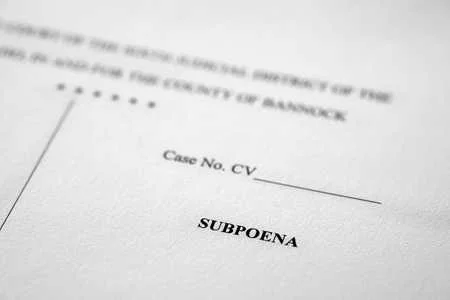How Can Courts Help Creditors Enforce Subpoenas?

Subpoenas are easily the most common means by which creditors seek to enforce judgments. Article 52 of the CPLR provides creditors with broad authority to issue subpoenas when seeking to collect on judgments. Subpoenas can be served on debtors as well as any third parties whom the creditor reasonably believes to have information relevant to the satisfaction of the judgment, and can require the party served to provide information to the creditor, produce documents, and/or appear for a deposition and testify about any matter relevant to the satisfaction of the judgment.
Even though a subpoena may be issued by the creditor’s attorney rather than the court, it is still considered a legal order. Therefore, a party who fails to comply with a duly served subpoena may be held in contempt of court and could be subject to fines, penalties, or even imprisonment. This threat can be most effective when dealing with third parties, who may not be willing to risk such consequences to protect the debtor, but can also place added pressure directly on the debtor to satisfy the judgment.
When a party fails to comply with a subpoena, the creditor can file a motion seeking an order to hold the non-compliant party in contempt of court. In granting such an order, the court will typically require the party who was served with the subpoena to comply with the subpoena by a certain date. If the party violates the court’s order by continuing to refuse to comply, then the court may impose more serious and tangible sanctions.
One type of relief the court may grant is to issue a warrant of commitment, meaning that a warrant may be issued for the non-compliant party’s arrest. This warrant will not cause the police to actively search for the person in order to arrest them, but it could lead to an arrest if, for example, the person is stopped by the police and the investigating officer runs a warrant search and sees the outstanding warrant. The individual would likely be taken into custody, and could be required to comply with the subpoena in order to be released from custody.
The creditor may also seek to have the non-compliant party pay fines or sanctions, including attorneys’ fees and the costs incurred by the creditor in filing the contempt motion. Similarly, the creditor may seek an order under CPLR § 8303(b) to enter a separate judgment against the non-compliant party equal to 5% of the underlying judgment. If the debtor is the non-compliant party, the threat of an additional judgment equal to 5% of the underlying judgment may not have a strong impact, but a third party may view the potential judgment as a significant risk that the party would prefer to avoid.
The relatively low standard for serving subpoenas, the ease at which they can be served, the broad information they can seek, and the consequences they can bring to any party who fails to comply make subpoenas popular tools for enforcing judgments. Contact our office if you have questions about post-judgment subpoenas or if you’d like to learn more about the ways in which subpoenas can be used to enforce a judgment.
